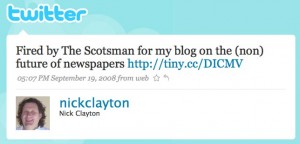Redundancies across the group and a pay freeze for all staff haven’t stopped the Johnston Press bosses taking home rather juicy bonuses for 2009. As reported by the Times earlier this month, Johnston Press closed five papers last year, and 768 staff left the group in 2009. Pre-tax profits for 2009 were £43 million, a drop of 56 per cent.
But as reported by Johnston Press’ own paper, the Scotsman, John Fry, the group’s chief executive, took home £959,000 in pay, benefits and bonuses in 2009.
The package, reported in the group’s annual report this week, included: £210,000 cash bonus; a £210,000 performance-related bonus paid in shares (deferred for three years); and a basic salary of £525,000.
The Scotsman reports that his predecessor, Tim Bowdler, who retired in early 2009, was awarded £573,000 in basic pay in 2008. “All executive directors waived their right to a performance-related bonus that year,” it says.
Basic salary for the group’s two other executive directors, chief financial officer Stuart Paterson and chief operating officer Danny Cammiade, did not increase but they took home total packages of £655,000 and £590,000 respectively. In 2008 they took home £363,000 and £342,000 in total, respectively.
Here’s the comparison visualised in a chart. This shows the % change in £ from 2008 figures to 2009 figures (we’ve compared Fry’s pay package with Bowdler’s). The middle column at 0 represents the basic salary pay freeze across the group.
Blue: JP CEO pay package / Red: JP chief financial officer pay package / Yellow: chief operating officer pay package / Green: basic pay rise across group / Grey: total group revenue / Dark blue: advertising revenue / Magenta: JP pre-tax profit
